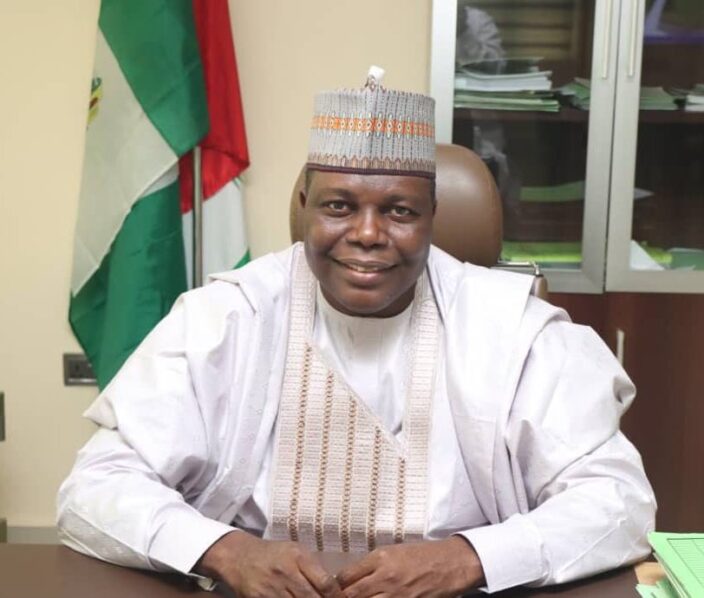
Last week, the auspicious city of Kano was agog as the Dambatta Academic Forum (DAF), an elite group of indigenes of Kano, honoured the Director General of the National Biotechnology Research and Development Agency (NBRDA), Professor Abdullahi Mustapha, for being a trailblazer in science and a dedicated servant to humanity.
It was a moment of vicarious joy for most scientists, researchers, and policymakers within Nigeria’s biotech ecosystem. Those who are familiar with his solution-oriented style of leadership were enthralled, particularly since, we live in an era when visionaries struggle to find recognition in their backyard.
Similarly, former President Muhammadu Buhari took notice of Professor Mustapha’s dedication to breaking barriers, shaping minds, and meritorious service to the nation. Hence, on May 26, 2023, he was conferred the National Productivity Order of Merit (NPOM) Award.
This well-deserved recognition from his kinsfolk is a glowing tribute to Mustapha’s spirited dedication to creating new pathways for the future of biotechnology. His altruistic efforts to ensure biotech remains a driver of sustainable national development, which led to the passage of the National Biotechnology Research and Development Agency (Establishment) Act, 2022 is salutary. The Act provides a legal framework that catalyses innovative growth in biotechnology.
Under his astute leadership, NBRDA has made laudable progress in agricultural biotechnology. He encourages management and staff to create biotech solutions for sustainable national growth and Nigeria’s attainment of food security.
Consequently, the agency keeps championing cutting-edge research that enhances crop yields, develops resilient farming techniques, and mitigates the challenges of climate change. Stated empathically, Mustapha’s research-leadership efforts are improving food production systems and enhancing nutrition and economic sustainability.
Also, Mustapha’s seasoned leadership is revolutionising pharmaceutical production and medical biotech. NBRDA’s innovations now incentivise the local production of diagnostic kits and essential drugs as seen during CIVID-19. This implies the agency is reducing dependence on imports, and strengthening Nigeria’s healthcare system.
One of the hallmarks of Mustapha’s leadership is his exceptional passion for nurturing the next generation of scientists and creating new cohorts of innovative researchers. The establishment of the Young Researchers Forum (YRF), which functions as a training ground and launching pad for young biotech innovators is an expression of his desire to create institutional mechanisms that bridge intergenerational gaps through mentorship.
Two years after its formation, YRF’s efforts in mentoring and empowering young researchers to push the boundaries of scientific discovery, collaborate, and solve real-world problems are yielding fruits. Some of the young researchers are in the process of turning their research findings into tangible products with competitive market value.
Without fear of contradiction, Mustapha’s forward-looking leadership gives meaning to the axiom: “What is past is a prologue to the future.” In his mentoring sessions with budding innovators, he often reiterates that leadership involves understanding past challenges and successes and envisioning how those experiences can guide future advancements. Thereby, encouraging research leaders to leverage past knowledge to drive teams toward pioneering solutions, anticipating emerging trends, and making transformative socioeconomic impacts.
It is equally important to note that Mustapha is a growth facilitator and driver of institutional reforms. His knack for reforms has facilitated the career advancement of many innovative researchers and scientists who were stagnated. By reworking the organogram of NBRDA and creating new departments that cater to emerging challenges, he made it possible for many deputy directors who were stagnated because of no vacancies to become directors.
As some scholars and experts have noted, the nascent NBRDA Journal of Biotechnology is a fruit of his vision and ingenuity. By establishing this journal, he has created a platform for advancing scientific research and innovation in biotechnology, particularly within the African context. This dynamic platform of intellectual engagement and knowledge sharing is fostering collaboration between local and international researchers and addressing pressing health, energy, and agricultural challenges. It is also decentralising the locus of knowledge production and inevitably elevating the profile of Nigerian science.
Beyond being a reward for assiduous work, the honour bestowed on Mustapha by DAF a week before his birthday offers a staple for reflection. It signifies that perseverance pays where and when an architect of progress is often greeted with skepticism. Also, as the nation struggles with the japa syndrome, it teaches that greatness emerges not only in foreign lands but even in the place of one’s nativity.
Beyond his scientific acumen and leadership, Mustapha is a man of integrity, humility, and compassion. His commitment to national development is driven by a deep sense of responsibility towards his fellow citizens. Hence, he instinctively stimulates people to dream bigger and work harder in service of a better and more sustainable future.
From his early days as a student at Barde Primary School, Dambatta, Government Secondary School, Kazure, and Bayero University, Kano, to his becoming a Professor of Bioinorganic Chemistry at the Federal University, Dutse (FUD), Jigawa State, his commitment to knowledge, innovation, and society has paved the way for development.
His past works suggest that in the days ahead, he will remain a paragon of excellence who inspires people to overcome obstacles, develop their leadership capital, and dedicate their services to the holistic betterment of Nigeria.
Omozuwa is the press secretary to the director general, NBRDA.
.
.






